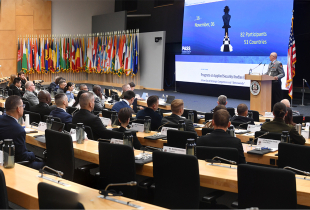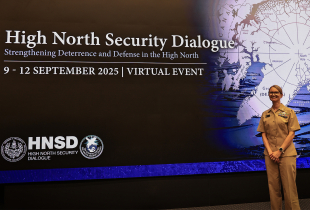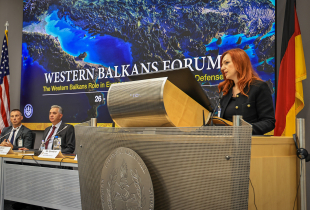
Regional Security Seminar: Turkish Foreign and Security Policy Under the New Government
Introduction
The Marshall Center organized an online Regional Security Seminar (RSS) exploring Turkey’s reorientation of foreign and security policy after the elections in May 2023. The event was moderated by Dr. Cüneyt Gürer, professor of Transnational Security Studies at the GCMC, and panelists Ambassador Dr. Michael Sahlin, distinguished Associate Fellow at the Stockholm International Peace Research Institute European Security Programme, and Dr. Yevgeniya Gaber, a Ukrainian foreign policy expert and a Non-Resident Senior Fellow at the Atlantic Council in Turkey provided insights to better understand Turkey’s foreign policy reorientation and made assessments on possible policy actions in the future.
After the elections in May 2023, Turkish President Erdogan secured his third term of his presidency and appointed a new “technocratic” government consisting of individuals with moderate and technical backgrounds. President Erdogan's new cabinet is considered a sign of his willingness to work with the West and his prioritization of domestic economic challenges. However, the level of pragmatism and path dependency make it difficult to have a structural shift in line with the national interest of the country. The panel highlighted early indications of foreign and security policy changes under the new government and assessed Turkey’s approaches to various regional security challenges, including the war in Ukraine, support for Sweden’s NATO membership, developments in the Middle East, and relations with Russia and China.
The discussions during the panel focused on two critical developments in Turkish foreign policy following the elections: Turkey’s decision to lift its opposition and support Sweden’s bid for NATO membership and its unequivocal demonstration of support for Ukraine in the face of unprovoked aggression by Russia.
Key takeaways from the panel
- Sweden has to deal with the controversial issue of Quran burning both at home and abroad and work on the dilemma that could also be considered the price of freedom. The country is being accused of supporting terrorism by Turkey while nevertheless becoming the target of attacks at the same time. This issue is very much connected with Sweden’s NATO membership, as Sweden’s approach to freedom of expression and assembly could cause a backlash in Turkey’s ratification process and could be used in domestic politics to hold the support process.
- The process of Sweden’s NATO membership and Turkey’s confirmation of support during the Vilnius Summit did not conclude the process, but rather restarted it, with Turkish conditionalities still hinted at. Therefore, considering Sweden’s NATO membership a “done deal” seems to be premature. All parties involved in these discussions (NATO, Turkey, and Sweden) should make sure the ratification and following procedures continue smoothly to make sure additional challenges don’t block the process in the near future.
- Turkey’s reorientation to the West after the election is an economy-driven reorientation; therefore, future political engagements and policy discussions should make sure that structural changes complementing the re-orientation will be introduced to the processes so Turkey’s reorientation has institutional backing.
- With the new government in Turkey, we can expect more technical solutions to domestic and international challenges rather than highly political and often controversial approaches that hinder country’s national interests. Nevertheless, rational technocrats will still find it challenging to work with the politically motivated leaders and their loyal connections in the bureaucracy until the local elections in Turkey (March 2024).
- Turkey’s balancing of relations between the West and Russia was not necessarily based on the mutual trust between the two countries but (at least from the Turkish side) on Turkey’s decreasing level of trust with the West. Even though Turkey is a NATO member country, the level of distrust threatens future relations and especially forces Turkey away from the West and creates opportunities for Russia, which isn’t always in line with the national interest of Turkey. Turkey has become more dependent on Russia than in the past, and it gets even more difficult to balance the relationship that started after 2016.
- Turkey’s position in the region, its previous commitments to be part of the West, and the country’s active role in many international institutions make Western reorientation a logical process. However, pragmatic moves without institutional support and a highly personalized foreign policy not only hinder the long-term relationship but also make the reorientation unreliable. Both Turkey and the West should make sure that Turkey’s recent Western pivot does not remain a short-term tactical move driven by pressing economic problems at home but develops into a coherent and more stable foreign policy orientation.
- Russia’s war in Ukraine has offered a window of opportunity for Turkey to step up its security cooperation with NATO allies and to highlight its importance for the Alliance and generally, the European security. Ankara’s constructive role in deterring Russia on sea by closing the Straits, facilitating prisoners’ swap, and brokering the Black Sea Grain Initiative has garnered praise in the West. This moment should not be wasted. Turkey should make sure its economic and trade policies go in line with those of its Western partners (with the EU and US making up a large part of its foreign trade turnover leaving Russia far behind). In its turn, the West should respond with paying greater attention to Turkey’s own security concerns and sensitivities.
- Turkey has many dilemmas when it comes to choosing one foreign policy over another, and each choice has its own consequences. Only a clear understanding of the country’s national interests will help Turkey establish a firm position on solving these issues. As an example, Turkey wants to reestablish its torn relations with Syria, seeking Russian mediation; nevertheless, Syria stipulates that Turkish troops must leave the north of the country for the relations to start. However, this is not an easy decision for Turkey, as the country invested heavily in that region and considers being in that region a national security necessity. Turkey, therefore present leaving militarily as the last stage of the rapprochement process.
- China considers Turkey an important partner in its Belt and Road Initiative, and especially recently, Turkey’s role in the halted grain deal between Russia, Turkey, and the UN urged the newly appointed Chinese Foreign Minister to visit Turkey to reassure relations.
GCMC, July 30, 2023.
About the Authors
Ambassador Dr. Michael Sahlin, is a Distinguished Associate Fellow with the Stockholm International Peace Research Institute European Security Programme, and a member of the Royal Swedish Academy of War Sciences. Ambassador Sahlin has held many roles in the political and diplomatic arena. Dr. Michael Sahlin was the founder and first Director General of the Folke Bernadotte Academy.
Dr. Yevgeniya Gaber is a Ukrainian foreign policy expert, non-resident senior fellow at the Atlantic Council in Turkey, and Center in Modern Turkish Studies, Carleton (Karltin) University in Ottawa, Canada. Previously, she worked as a Foreign Policy Advisor to the Prime Minister of Ukraine, Deputy Director of the Diplomatic Academy at the MFA of Ukraine, and political officer in the Embassy of Ukraine in Ankara.
Dr. Güneyt Gürer is a professor of Transnational Security Studies at the George C. Marshall European Center for Security Studies. His research interests and areas of expertise comprise transnational security issues, regional security dynamics, human displacement, and non-state actors in contemporary conflicts.
Elena Walczak is a Master of Global Affairs candidate at the University of Toronto's Munk School of Global Affairs and Public Policy. She emphasizes in global security and human rights/global justice, with a particular interest in the overlap between the two fields.
The George C. Marshall European Center for Security Studies in Garmisch-Partenkirchen, Germany, is a German-American partnership and trusted global network promoting common values and advancing collaborative geostrategic solutions. The Marshall Center’s mission to educate, engage, and empower security partners to collectively affect regional, transnational, and global challenges is achieved through programs designed to promote peaceful, whole-of-government approaches to address today’s most pressing security challenges. Since its creation in 1992, the Marshall Center’s alumni network has grown to include over 15,000 professionals from more than 160 countries. More information on the Marshall Center can be found online at www.marshallcenter.org.
The Clock Tower Security Series provides short summaries of Seminar Series hosted by the George C. Marshall European Center for Security Studies. These summaries capture key analytical points from the events and serve as a useful tool for policymakers, practitioners, and academics.
Disclaimer: The articles in the Clock Tower Security Series reflect the views of the authors and are not necessarily the official policy of the United States, Germany, or any other government.


